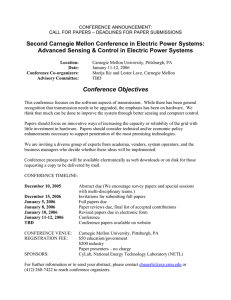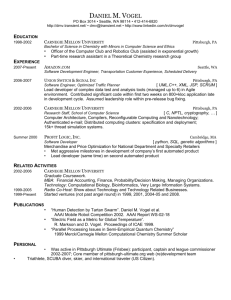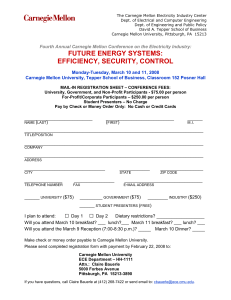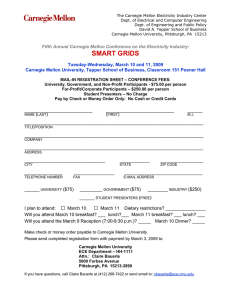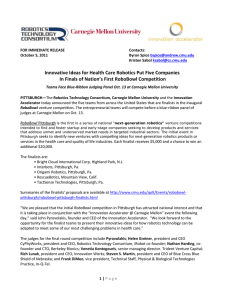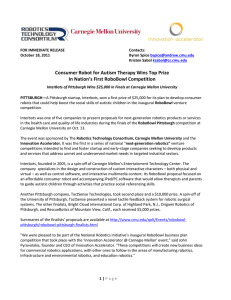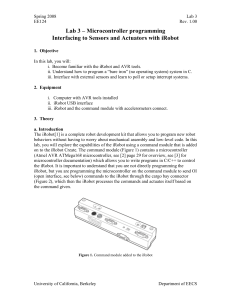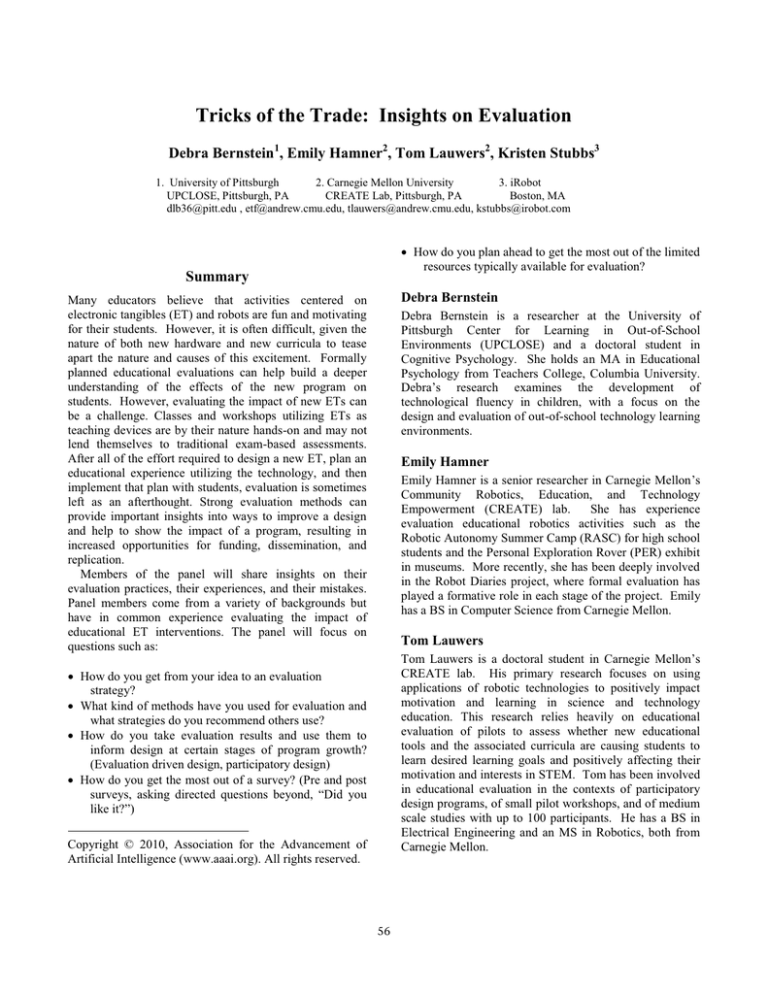
Tricks of the Trade: Insights on Evaluation
Debra Bernstein1, Emily Hamner2, Tom Lauwers2, Kristen Stubbs3
1. University of Pittsburgh
2. Carnegie Mellon University
3. iRobot
UPCLOSE, Pittsburgh, PA
CREATE Lab, Pittsburgh, PA
Boston, MA
dlb36@pitt.edu , etf@andrew.cmu.edu, tlauwers@andrew.cmu.edu, kstubbs@irobot.com
x How do you plan ahead to get the most out of the limited
resources typically available for evaluation?
Summary
Debra Bernstein
Many educators believe that activities centered on
electronic tangibles (ET) and robots are fun and motivating
for their students. However, it is often difficult, given the
nature of both new hardware and new curricula to tease
apart the nature and causes of this excitement. Formally
planned educational evaluations can help build a deeper
understanding of the effects of the new program on
students. However, evaluating the impact of new ETs can
be a challenge. Classes and workshops utilizing ETs as
teaching devices are by their nature hands-on and may not
lend themselves to traditional exam-based assessments.
After all of the effort required to design a new ET, plan an
educational experience utilizing the technology, and then
implement that plan with students, evaluation is sometimes
left as an afterthought. Strong evaluation methods can
provide important insights into ways to improve a design
and help to show the impact of a program, resulting in
increased opportunities for funding, dissemination, and
replication.
Members of the panel will share insights on their
evaluation practices, their experiences, and their mistakes.
Panel members come from a variety of backgrounds but
have in common experience evaluating the impact of
educational ET interventions. The panel will focus on
questions such as:
Debra Bernstein is a researcher at the University of
Pittsburgh Center for Learning in Out-of-School
Environments (UPCLOSE) and a doctoral student in
Cognitive Psychology. She holds an MA in Educational
Psychology from Teachers College, Columbia University.
Debra’s research examines the development of
technological fluency in children, with a focus on the
design and evaluation of out-of-school technology learning
environments.
Emily Hamner
Emily Hamner is a senior researcher in Carnegie Mellon’s
Community Robotics, Education, and Technology
Empowerment (CREATE) lab.
She has experience
evaluation educational robotics activities such as the
Robotic Autonomy Summer Camp (RASC) for high school
students and the Personal Exploration Rover (PER) exhibit
in museums. More recently, she has been deeply involved
in the Robot Diaries project, where formal evaluation has
played a formative role in each stage of the project. Emily
has a BS in Computer Science from Carnegie Mellon.
Tom Lauwers
Tom Lauwers is a doctoral student in Carnegie Mellon’s
CREATE lab. His primary research focuses on using
applications of robotic technologies to positively impact
motivation and learning in science and technology
education. This research relies heavily on educational
evaluation of pilots to assess whether new educational
tools and the associated curricula are causing students to
learn desired learning goals and positively affecting their
motivation and interests in STEM. Tom has been involved
in educational evaluation in the contexts of participatory
design programs, of small pilot workshops, and of medium
scale studies with up to 100 participants. He has a BS in
Electrical Engineering and an MS in Robotics, both from
Carnegie Mellon.
x How do you get from your idea to an evaluation
strategy?
x What kind of methods have you used for evaluation and
what strategies do you recommend others use?
x How do you take evaluation results and use them to
inform design at certain stages of program growth?
(Evaluation driven design, participatory design)
x How do you get the most out of a survey? (Pre and post
surveys, asking directed questions beyond, “Did you
like it?”)
Copyright © 2010, Association for the Advancement of
Artificial Intelligence (www.aaai.org). All rights reserved.
56
Kristen Stubbs
Kristen Stubbs is the Science, Technology, Engineering,
and Math (STEM) Outreach Program Manager at iRobot.
She received her Ph.D. in Robotics from Carnegie Mellon
University and now directs SPARK, iRobot’s educational
outreach initiative.
Throughout her graduate and
postgraduate work in human-robot interaction and
educational robotics, Kristen has utilized a variety of
evaluation techniques, including interviews, ethnographic
observations, and questionnaires.
57


